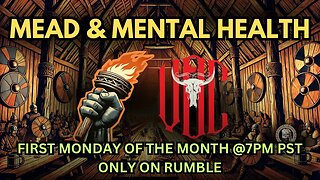Premium Only Content

Bible Study With Jairus - Leviticus 16
Bible Study with Jairus - Leviticus 16
The man who led our Bible study on Leviticus 16 asked a good question. When the high priest stood before God and used the blood to make atonement, did the Israelites still have sin (verses 14-15)? Clearly, the sprinkling of blood only covered sin temporarily. It didn't take the sin away forever. In the New Testament, our sin was cleansed by the blood of the Lord Jesus. Why do we still sin then? In the Old Testament, Balaam prophesied that Israel was blameless in his sight (Numbers 23:21). The New Testament also says that the church is holy and blameless (Ephesians 5:27). How can we look at the Israelites and ourselves as blameless when we know that the Israelites were full of apostasy and sin, and we in the New Testament church also still sin? How can these two seemingly contradictory truths be explained? This led to a lively discussion. There is a famous Christian song titled: "I'm only a sinner saved by grace." I also mentioned this in a message. A Chinese listener sent a letter telling me that I was wrong. We are no longer sinners; we are saints. I replied to him, saying that this was translated from an English song into Chinese. The English title is: "I was a sinner saved by Grace," so this sentence is correct, but because Chinese has no tenses, naturally, the original meaning cannot be seen. There is nothing wrong with the expression in English.
If you search online, there are a large number of articles proving "You Are Not Just a Sinner Saved by Grace." I haven't read each article entirely, but it's clear that we are no longer sinners after we are saved. Peter says we are a chosen generation, a royal priesthood, a holy nation, and his own special people (1 Peter 2:9). But how do we understand Paul's comment about himself being the chief of sinners?
Let's look at two aspects of truth. First, I agree that when we are saved, we are no longer sinners but saints. Once we are saved, the Bible says we are the righteousness of God in Christ Jesus. His death on the cross provided freedom from sin for us.
We can analyze it from several aspects. 1 John 3:9 (NIV) says, "No one who is born of God will continue to sin." I was saved in the Local Church Movement. We were taught that "born of God" here refers to our spirit. Our spirit is holy and, therefore, cannot sin. But our souls and flesh have not been transformed by the life of God, so we will still sin. Because we are still in the transformation process, our soul or flesh isn't holy, which is why we can still sin. I think this makes a lot of sense.
We are composed of 3 parts: body, soul and spirit. As a believer in Christ, God has drawn a boundary that keeps Satan and sin from touching our born again spirits. Even when we sin through our mind, will, or emotions through jealousy, covetousness, etc., our spirit is protected. The same is true when we sin in our flesh, such as stealing, adultery, etc. Nothing can come against our born again spirit, which is sealed by God. When you are born again, you become one spirit with God (1 Corinthians 6:17). An unbeliever committing the same sins does not have that protection, and his spirit can die.
READ MORE: https://jbwm.org/
-
 26:13
26:13
BibleStudyWithJairus
3 years agoBible Study With Jairus - Leviticus 9
56 -
 23:21
23:21
BibleStudyWithJairus
3 years agoBible Study with Jairus – Leviticus 3
73 -
 23:23
23:23
BibleStudyWithJairus
3 years ago $0.01 earnedBible Study With Jairus – Leviticus 1
46 -
 34:34
34:34
BibleStudyWithJairus
3 years agoBible Study with Jairus - 1 Corinthians 4
65 -
 55:40
55:40
BibleStudyWithJairus
3 years agoBible Study with Jairus - 1 Corinthians 3
21 -
![🔴[LIVE] PVP and ATHENA | Sea of Thieves | Day 606/710 ~ Zen Premium Gaming - Daily Live Streams](https://1a-1791.com/video/fww1/c0/s8/1/x/t/i/A/xtiAy.0kob-small-LIVE-PVP-and-ATHENA-Sea-of-.jpg) LIVE
LIVE
Zen Premium Gaming
5 hours ago🔴[LIVE] PVP and ATHENA | Sea of Thieves | Day 606/710 ~ Zen Premium Gaming - Daily Live Streams
69 watching -
 1:05:32
1:05:32
Donald Trump Jr.
16 hours agoNews Not Noise, Live with Power the Future's Daniel Turner | TRIGGERED Ep.231
204K94 -
 LIVE
LIVE
IMICANIS
6 hours agoSuper Mario
25 watching -
 LIVE
LIVE
AndersonGaming
4 hours agoDoom Eternal - LIVE
30 watching -
 2:13:28
2:13:28
I_Came_With_Fire_Podcast
11 hours agoMEAD & MENTAL HEALTH WITH I CAME WITH FIRE AND VOC!!!
68.8K4